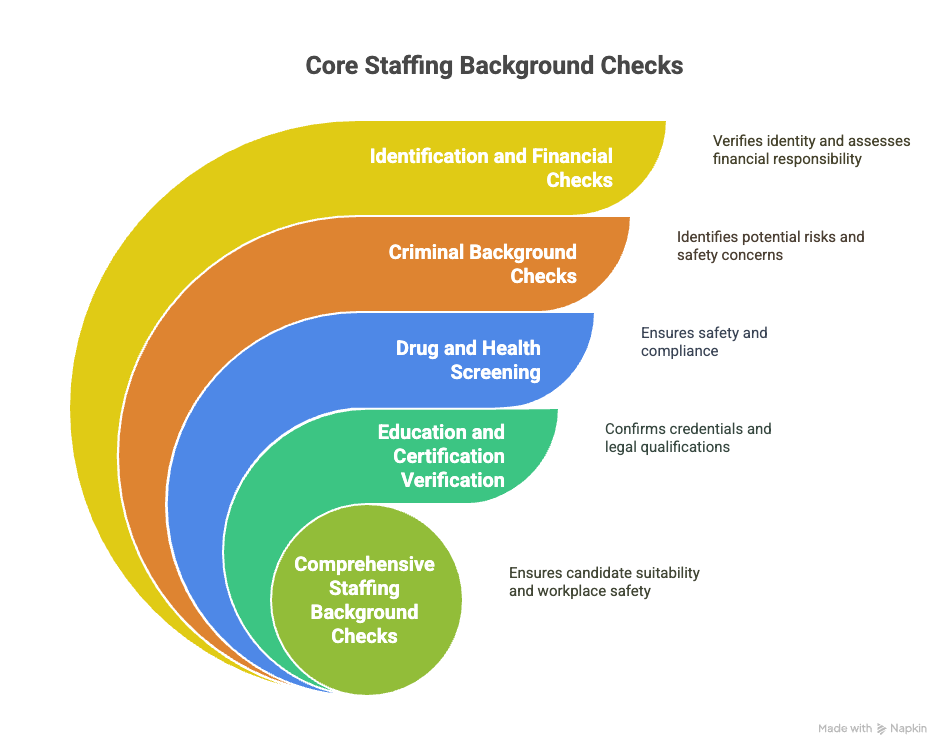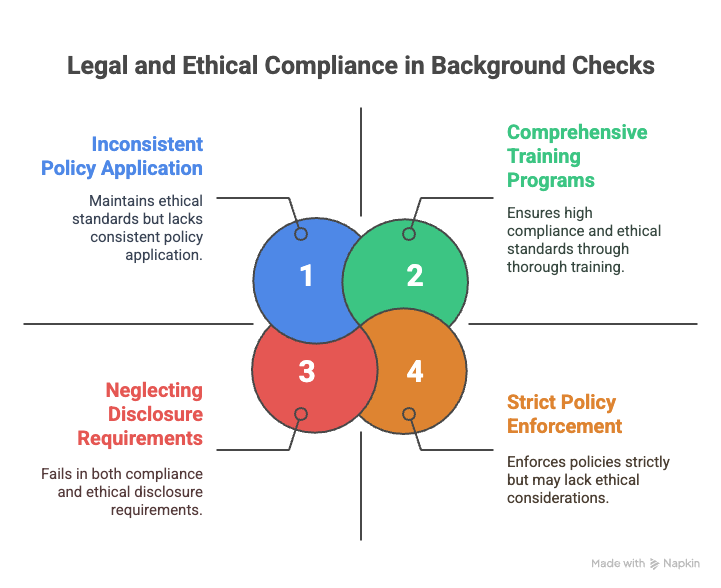In the staffing industry, finding and placing the right talent is crucial to success. One effective way to ensure that candidates meet the client's expectations and maintain a safe work environment is through thorough background checks. Here, we’ll explore the core staffing background checks that every staffing firm should run. We will also uncover best practices, data-driven insights, and action-oriented recommendations to optimize the hiring process while ensuring compliance and accuracy.
Key Takeaways
- Background checks are essential tools for ensuring the reliability and qualifications of staffing candidates by verifying past employment, education, and checking for criminal records.
- Conducting background checks helps reduce turnover rates by ensuring that candidates genuinely possess the qualifications they claim, aligning their skills and values with the job requirements.
- Compliance with the Fair Credit Reporting Act (FCRA) and Equal Employment Opportunity Commission (EEOC) guidelines is crucial in avoiding legal issues and maintaining non-discriminatory hiring practices.
- Different background checks, such as identity verification and past employment checks, provide valuable insights into a candidate's history, improving placement accuracy and maintaining workplace safety.
- Incorporating technology in background checks streamlines the process, reducing manual errors and offering quick, accurate results while safeguarding candidates' data.
Introduction
Background checks are your shield and spotlight in staffing. They help you trust the candidates you represent while steering clear of potential risks. These checks dig into the essential areas—like a person’s past jobs, education, criminal records, and more—to ensure you're placing reliable talent. Think of them as your tool for building trust and managing risk in the workplace.
When you work in staffing, these checks aren't just beneficial; they're vital. They give you confidence in candidate qualifications and promote safety on the job. This article walks through the must-run checks for staffing firms. You’ll learn about effective screening strategies, backed by data and practical advice. Get equipped to boost your hiring success and stay compliant with regulations. Dive into the essentials that every staffing firm should consider as standard in their screening process.
EXPERT INSIGHT: In staffing, I've learned to view background checks as something more than a compliance process—more as a trust builder. Our clients trust us to deliver good people into their buildings, and candidates trust us to do it in an honest and fair way. Consistent, thorough process avoids misses, safeguards culture, and builds trust in results across the board. It's not about creating barriers, it's responsible door-opening, if done correctly. How strong are your background check practices in walking the tightrope between fairness and safety? - Charm Paz, CHRP
The Role of Background Checks in Staffing
Background checks form a cornerstone in staffing. They ensure the candidates you place are not only qualified but also trustworthy. When you run a background check, you delve into a person's past, verifying the accuracy of their application details and uncovering any potential red flags. This process reduces risks and builds an environment of trust with your clients.
Ensuring Quality Hires
Quality hires are central to any staffing strategy. You want candidates who match the job requirements and will stay in their roles, reducing turnover rates. Background checks contribute significantly to this goal. By verifying education, employment history, and qualifications, you can better predict a candidate’s job performance and cultural fit. For instance, a study by the Society for Human Resource Management found companies that conduct background screening have 30% better retention rates.
Risk Mitigation
Beyond hiring accuracy, background checks are essential for risk mitigation. Legal compliance is crucial, especially adhering to the Fair Credit Reporting Act (FCRA) and Equal Employment Opportunity Commission (EEOC) guidelines. Non-compliance can lead to lawsuits and penalties. A compliant process ensures you respect candidates' rights while obtaining the necessary details to make informed decisions. Furthermore, background checks play a pivotal role in maintaining workplace safety. By identifying criminal history or instances of violence, you can prevent potential threats, safeguarding both your employees and clients. Are your current practices strong enough to protect everyone involved?
Ensuring Quality Hires
Background checks are a must if you want quality hires consistently. You can't rely just on resumes and interviews. They often hide gaps or exaggerate achievements. A thorough background check can uncover these issues. It's a simple way to avoid unnecessary hiring mistakes.
Look at it this way: you want to confirm that job applicants are who they say they are and have done what they claim. This includes verifying education, past job roles, and even their criminal history. Suppose an applicant claims to have a degree. A quick check can confirm this and save you from a future headache if the claim turns out false.
Investing in thorough screening reduces the chances of making a poor hire. It helps you find candidates who truly fit your job requirements. Statistics show that verified hires perform better and stick around longer. This means less turnover for your staffing firm, which translates to cost savings and better client satisfaction.
It's not just about finding someone who can do the job. It's about finding someone who fits in and will stay with the company. This is where background checks play a crucial role. They help you maintain a high standard by filtering out unsuitable candidates early on. Would you prefer to catch a misstatement during the hiring process or after they've started disrupting your work environment? The answer seems clear.
Use background checks as a tool for precision and accuracy in your hiring process. They are not just a safeguard but an enabler of quality hires.
Types of Core Staffing Background Checks
The backbone of successful staffing lies in thorough background checks. Here’s a streamlined look at the key screenings every staffing firm should prioritize:

Identification and Financial Checks
Begin with identity verification. Social Security number trace is a simple way to confirm a candidate's identity. It matches the applicant’s name with their Social Security number to flag potential inconsistencies. This provides a basic yet crucial layer of assurance about who you are bringing into your client’s workplace.
Credit history review isn't just for financial roles. It's a valuable tool to assess candidates for positions involving fiscal trust. Reviewing credit reports helps you gauge financial responsibility. This can be a deciding factor in roles where money handling is regular and risk mitigation is a priority.
Employment Verification Process
Past employment verification offers clarity on a candidate’s work history. It involves contacting former employers to confirm positions held, dates of employment, and, in some cases, responsibilities and performance. This helps you ensure that the narrative in a resume matches reality.
Don't underestimate reference checks. While it may seem old-fashioned, speaking with past supervisors or colleagues can uncover insights not captured in a resume or through formal verification processes. People frequently highlight both strengths and areas for development, adding depth to your understanding of a candidate.
Criminal Background Checks
The national criminal database scan is your go-to for uncovering criminal histories. This check could reveal records not provided by the candidate, giving you a fuller picture of potential risks. It's an efficient way to identify red flags that might impact the safety or integrity of the workplace.
For positions interacting with vulnerable populations, accessing the sex offender registry is essential. It’s a non-negotiable step, ensuring that your candidates aren’t listed and reducing risks in sensitive environments.
Drug and Health Screening
Drug testing remains prevalent in the staffing industry. Standard tests screen for substances like marijuana, cocaine, and opioids. They help ensure that candidates comply with workplace safety standards and promote a drug-free environment.
Health assessments are less common but necessary in certain roles, especially those with physical demands. These evaluations determine if individuals meet the physical requirements of a job, protecting both the employee and the employer from potential injury or liability issues.
Education and Certification Verification
Verify academic credentials to confirm the educational achievements claimed by candidates. This step is vital for roles that require specific degrees or coursework and prevents credential fraud.
For positions that call for specific professional licenses, checking the validity and currency of these licenses is crucial. This ensures that the candidate is legally qualified to perform the required occupational tasks, safeguarding both employee and employer from legal repercussions.
Best Practices for Running Background Checks
Conducting thorough background checks involves more than just gathering data. You need to navigate complex legal and ethical landscapes while employing efficient tools and methods. A few practical strategies can help you maintain compliance and efficiency.
Legal and Ethical Considerations
First, focus on FCRA compliance. This involves obtaining clear consent from the candidate before starting any background check. Ensure you provide a standalone disclosure that is transparent and free of unnecessary language. FCRA compliance also means giving candidates the opportunity to review and contest the findings of their background checks.
Next, integrate EEOC guidelines into your process. This means ensuring that your checks don't inadvertently discriminate against candidates based on race, color, sex, or other protected categories. For instance, if you use criminal records to make hiring decisions, evaluate how the nature and timing of the offense relate to the role you are filling.
Utilizing Technology
Incorporate advanced screening tools into your process. Many platforms now offer integrated solutions that streamline identity verification, criminal records, and credit checks. By automating routine checks, you can significantly reduce the time and potential for human error in this process. Plus, technology can help you stay updated with the latest regulatory changes, ensuring ongoing compliance without manual oversight.
Automation in Background Checks
Automation isn't just a buzzword; it's a means to enhance accuracy and efficiency. Automated systems can quickly sift through vast databases, flagging potential issues for further review. This allows your team to focus on critical decision-making rather than data entry. However, balance automation with human oversight to confirm that nuanced details are not overlooked.
By combining legal diligence with technology, you can enhance your background check process, making it both efficient and compliant. These strategies will help you protect your firm and provide reliable staffing solutions to your clients. Are your current methods hitting the mark? Consider these practices as you refine your approach.
Legal and Ethical Considerations
Navigating the legal landscape of background checks requires careful attention to the Fair Credit Reporting Act (FCRA). To stay compliant, you must first provide candidates with a clear disclosure and obtain their written consent before conducting a background check. It's crucial to ensure that this disclosure is a separate document, not bundled with other application materials.

When adverse actions are taken based on background check results, such as not hiring a candidate, follow the FCRA's two-step process: provide the candidate with a pre-adverse action notice, including a copy of the report and a summary of their rights. Allow them time to dispute any inaccuracies. If you still decide not to proceed, send a final adverse action notice.
Aligning with Equal Employment Opportunity Commission (EEOC) guidelines helps avoid discrimination based on race, color, national origin, sex, or religion. The EEOC advises employers to assess how any criminal records relate to the job in question. You should ensure that policies are consistently applied across all candidates and include individualized assessments where appropriate.
Regular training for your HR staff on compliance and discrimination avoidance helps reinforce these practices. By embedding legal and ethical considerations into your background check processes, you safeguard your firm's reputation and build trust with both clients and candidates. How do your current practices align with these legal obligations?
Actionable Takeaways for Staffing Firms
Create a detailed background check policy. Start with clear guidelines on which checks are mandatory for different roles. Tailor these based on the industry and job requirements. For instance, financial roles may need a credit history review, while healthcare roles might require more stringent criminal checks.
Keep your policies updated. Legal requirements and industry standards change frequently. Make it a habit to review your policies regularly to ensure they meet current regulations. This helps you avoid compliance issues and potential legal challenges.
Invest in staff training. Your team should know how to conduct checks accurately and effectively. Regular training sessions can keep staff informed about best practices and any changes in laws or internal procedures. This ensures consistency and reliability in your screening processes.
Consider technology solutions. Automation tools can streamline the background check process, reducing manual errors and saving time. Reliable software options can handle everything from ID verification to employment history checks. This can free your team to focus on more complex tasks that require personal judgment.
Conclusion
Adopting comprehensive background check practices is a proactive step towards fostering a dependable and efficient staffing environment. Implement these essentials to support your firm’s growth and reliability in the staffing industry.
For more insights on background checks and related topics, visit our blog.
Frequently Asked Questions (FAQs)
What Background Checks Are Legally Required for Staffing Agencies?
Staffing agencies are generally required to conduct background checks to ensure candidates are eligible for employment. This usually involves criminal checks, employment verification, and sometimes education verification. The specific requirements can vary based on state laws and the industry involved.
How Far Back Do Staffing Agency Background Checks Go?
The standard time frame for background checks is typically seven years. However, serious criminal convictions like felonies might be reported indefinitely, depending on state laws.
Do Staffing Agencies Check Employment History?
Yes, staffing agencies often verify your employment history. They may contact former employers to confirm the dates you worked there, your job title, and your reason for leaving.
What Disqualifies You from a Staffing Agency Background Check?
Certain factors might disqualify you, such as violent felonies, fraud, or a history of theft. However, this can depend on the job's nature and the employer's discretion.
How Long Do Background Checks Take for Staffing Agencies?
Background checks usually take anywhere from a few days to a week. The exact duration can depend on the complexity of the check and how quickly information is provided by third parties.
Are Drug Screens Part of Staffing Agency Background Checks?
Many staffing agencies include drug testing as part of their background checks, especially for positions that require safety and responsibility.
Do Staffing Agencies Check Credit History?
Some staffing agencies may check credit history, particularly for positions involving financial responsibilities. Consent is typically required.
Can You Dispute a Background Check Result?
Yes, if you believe there are errors in your background check, you have the right to dispute the results. Contact the screening company directly to correct any inaccuracies.
Is a Social Media Check Part of the Background Process?
Some staffing agencies may review your social media presence, as it can provide insights into your character and behavior. This is more common in roles that represent a company's public image.

GCheck Editorial Team
Meet the GCheck Editorial Team, your trusted source for insightful and up-to-date information in the world of employment background checks. Committed to delivering the latest trends, best practices, and industry insights, our team is dedicated to keeping you informed.
With a passion for ensuring accuracy, compliance, and efficiency in background screening, we are your go-to experts in the field. Stay tuned for our comprehensive articles, guides, and analysis, designed to empower businesses and individuals with the knowledge they need to make informed decisions.
At GCheck, we're here to guide you through the complexities of background checks, every step of the way.






